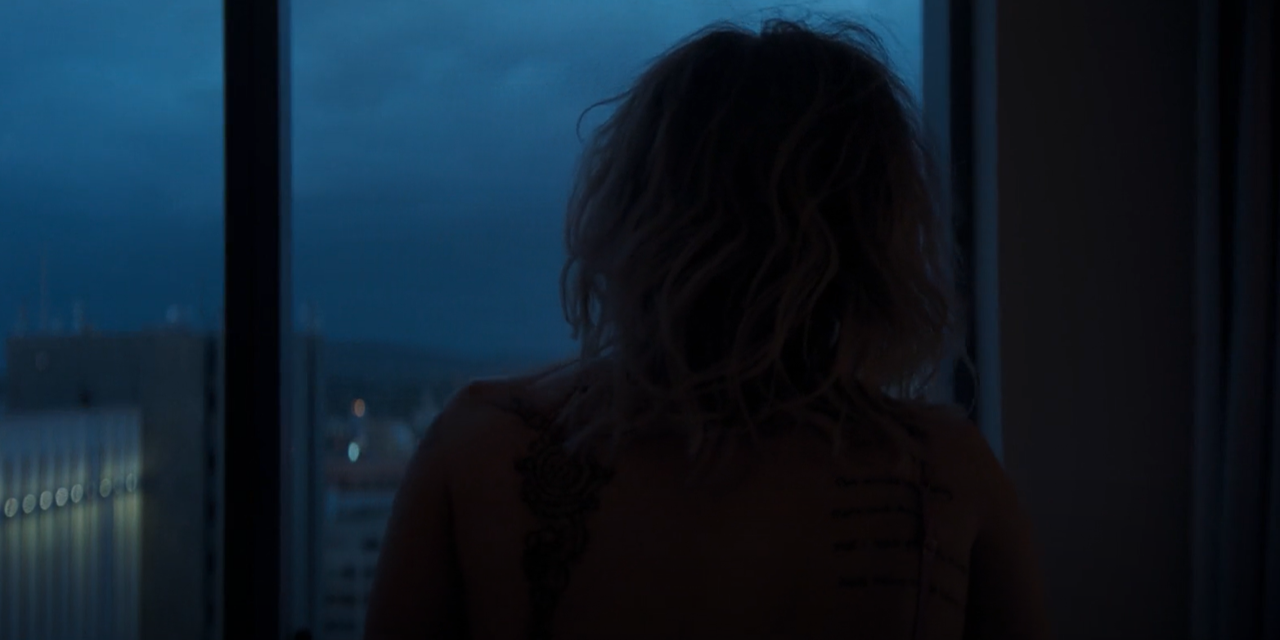Helmed by Benjamin Caron, Netflix’s ‘Night Always Comes‘ tells the harrowing story of Lynette, who, along with her mother, Doreen, and elder brother, Kenny, faces the threat of losing her home. With only one night to secure $25,000 from scratch as a down payment, she heads out into the street, prepared to collect the money by any means necessary. This journey through the heart of Portland also involves a look inwards, as the protagonist has to confront her past and the uncomfortable secrets it holds. However, collecting the funds is just one of the many hurdles on her way, and Lynette soon finds herself entangled in a deeper mess. Throughout the narrative, her tattoos remain a unique feature, serving as a silent observer to the character’s ebbs and flows as she deals with new challenges on her way. SPOILERS AHEAD.
Vanessa Kirby’s Tattoos are Likely Temporary in Nature
In ‘Night Always Comes,’ Vanessa Kirby’s character, Lynette, features a number of tattoos, with the two most prominent ones being on the left and right sides of her back. The left side features an elaborate mandala pattern, which juts out tangled vines in all directions, creating a design vaguely resembling a Christian cross. On the right side of her back, the tattoo quotes the final stanza of Robert Frost’s “Stopping by Woods on a Snowy Evening.” Amongst other designs, Lynette also has a rose and a lightning symbol inked on her left arm, as well as another quote on her right forearm. Although its details are not clear, the word time stands out in the phrase, indicating that it is possibly a quote about the nature of time and how it affects a person. While the tattoos add to the character, it is likely that they are not real, and Kirby put them on specifically for her role in the movie.

Kirby was first spotted donning these tattoos while filming for her role in Portland, and a report by Daily Mail confirmed that the tattoos were not real. Furthermore, the actor’s public appearances since the production of ‘Night Always Comes’ substantiate this fact. Inking permanent tattoos is not a requirement in cinema, with temporary tattoos achieving the same effect with relatively less effort. However, the real significance lies in the meaning of the tattoos and the creative decisions that led to their placement in the narrative. The film is about a sexual abuse survivor learning to live for herself in the face of many trials and tribulations. As such, how she expresses herself and her bodily agency gains an additional layer when charted through her tattoos.
Lynette’s Tattoos Hold a Deeper Symbolic Meaning
The stand-out etching on Lynette’s back is undoubtedly the mandala structure, and its fusion of eastern and western religious traditions helps it gain a fuller meaning. In Buddhism and Hinduism, the mandala as a pattern represents the cyclicality of the cosmos and all its elements, which aligns with the protagonist’s trajectory throughout the story. As such, the tattoo can be interpreted as an analogue to her journey of reclaiming her identity from her mother’s perception by leaving the house once again, this time on her own accord. This brings her arc full circle. Additionally, its elaborate veins forming a cross structure might allude to Christian symbolism, and although faith is not a prominent part of Lynette’s arc, it is potentially informed by it in some capacity.

The poem stanza inked on Lynette’s back also brings out the themes of ‘Night Always Comes,’ as the phrase “But I have promises to keep” parallels how the protagonist is burdened by her responsibilities for much of the story. Notably, towards the end, she injures her back, causing blood to cover the entire quote. This appears to be an intentional choice on the creators’ end. One possible interpretation is that the character has used the poem to anchor herself thus far, and in its symbolic absence, she finally lets go and starts a new chapter of her life, free from all holdbacks. As such, the tattoos are more than just a showpiece that adds to the character’s outward self. Lynette’s designs serve as a means to explore how she thinks and feels, and their subsequent changes track the metamorphosis her character goes through as well.


